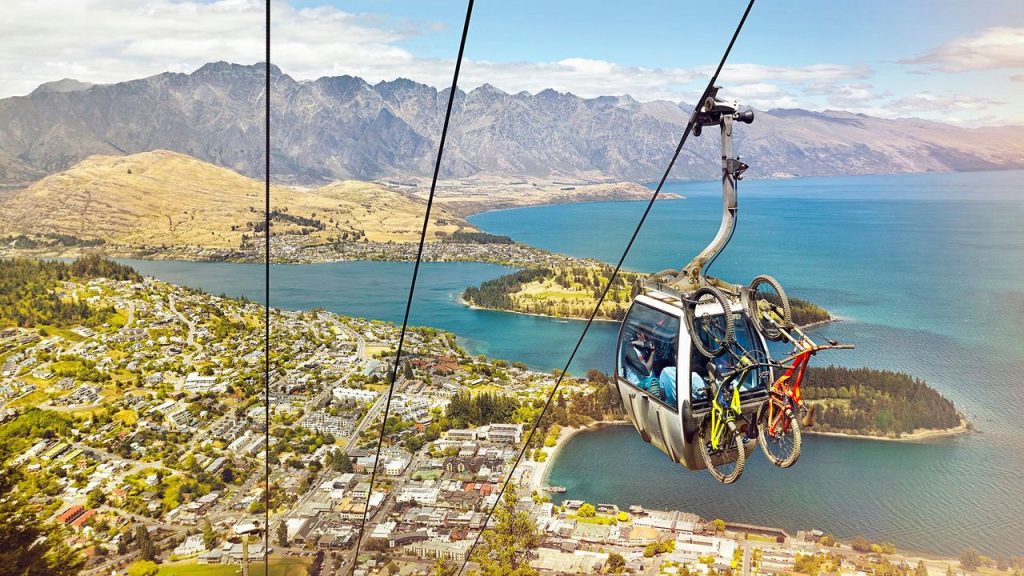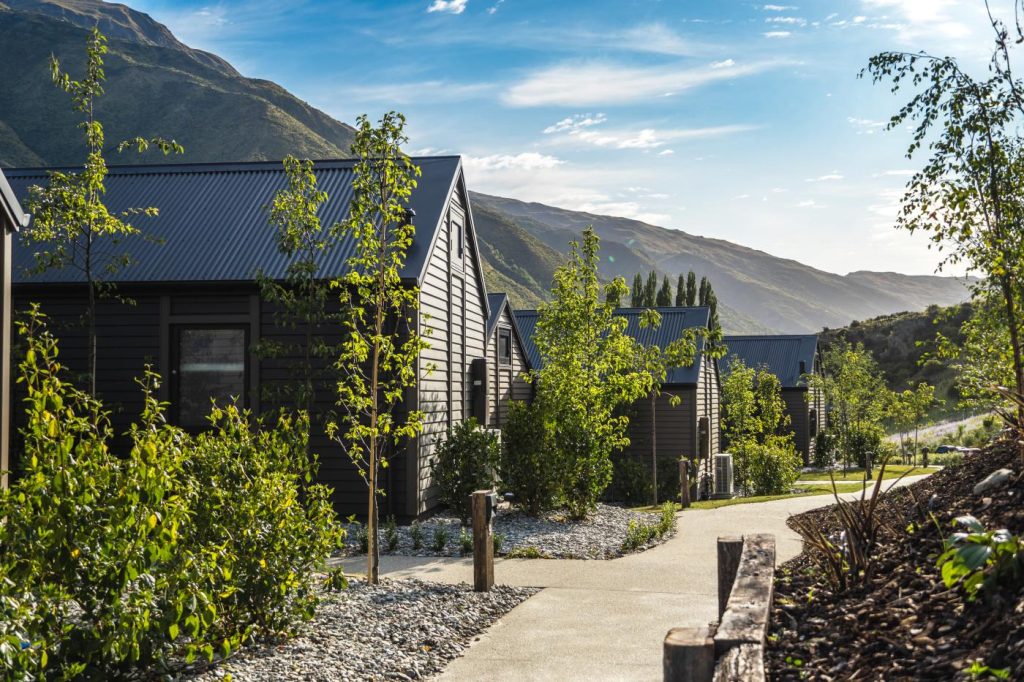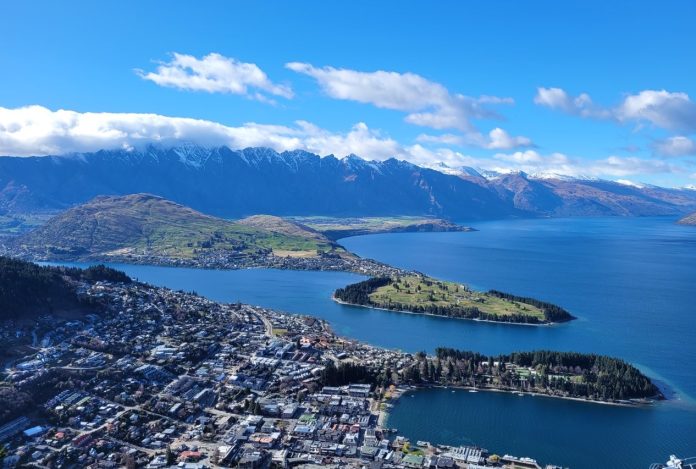Queenstown, a renowned tourist hotspot in New Zealand, is ambitiously pursuing the title of the world’s first carbon zero visitor economy by the year 2030.
Nestled on the South Island, Queenstown is known for its stunning landscapes, adventure sports, and a significant influx of tourists. The local community is rallying behind a bold initiative to eliminate carbon (Carbon zero)emissions completely, eschewing more manageable carbon-zero strategies that might involve carbon credits or offsets like tree planting. This initiative aims to foster a more sustainable tourism model without emitting any carbon dioxide.
Destination Queenstown’s CEO, Mat Woods, emphasizes the importance of urgency in reaching the 2030 goal. The timeline has ignited excitement within the community, requiring collective action from all residents and businesses to achieve this ambitious vision. The call for a carbon zero economy arose from growing concerns about the local infrastructure’s ability to handle the increasing number of visitors. The region has long been a favorite for skiing and outdoor adventures, drawing nearly 400,000 international visitors last year—an impressive nearly 20% increase from 2019, before the pandemic. This surge is especially noteworthy considering Queenstown’s relatively small permanent population of around 50,000.
The rapid growth of tourism has led to questions among locals about the sustainability of this influx. As Woods points out, residents began to ask, “What’s in this for us?” and pondered the region’s ability to sustain such high levels of tourism. In response, the three main local tourism organizations—Destination Queenstown, the Queenstown Lakes District Council, and Lake Wanaka Tourism—jointly proposed the ambitious carbon zero goal in 2021. To their surprise, the initiative received overwhelming support from local tourism operators and the broader community.
This commitment to becoming a carbon zero destination will fundamentally transform the way visitors experience Queenstown. By 2030, tourists may arrive on electric-powered Air New Zealand flights and travel through the area using electric gondolas or hydro-powered ferries that traverse the famous glacier-fed Lake Wakatipu. Ski enthusiasts will glide up the slopes on electric chairlifts, enjoying a winter sports experience that is not only thrilling but also environmentally responsible.
In a significant leap towards eco-friendly tourism, travelers may also enjoy high-speed rides on electric jet boats across Lake Wakatipu and the shallow rapids of the Shotover River. The iconic TSS Earnslaw, New Zealand’s oldest coal-fired passenger steamship, is also slated to transition to hydrogen fuel, enhancing the region’s eco-tourism credentials.
The vision for Queenstown’s carbon zero future reflects a significant shift in the local tourism industry. For decades, Queenstown earned its reputation as the “adventure capital of the world” through innovations that created unique and often adrenaline-pumping experiences, many of which have relied heavily on fossil fuels. Now, the town is pivoting towards becoming the ecotourism capital, positioning itself as a leader in sustainable travel.
One of the key figures in this transition is Michael Sly, known locally as Mr. Chippy. Sly runs a company called Waste To Wilderness, which has been making strides in composting food waste generated by local hotels. By processing around 20 tonnes of food scraps each month, Sly transforms waste into nutrient-rich soil suitable for food production. His work exemplifies regenerative tourism—an approach that not only minimizes environmental impact but actively contributes to the local ecosystem.
Sly believes that significant changes don’t always require monumental efforts; rather, small, consistent actions can lead to substantial results. He advocates for taking gradual steps toward sustainability, demonstrating that collective efforts can yield impressive outcomes.
This local commitment to sustainability is bolstered by the understanding that the region’s natural beauty is its greatest asset. Maintaining and enhancing this environment is crucial for the long-term viability of Queenstown as a tourist destination. The community recognizes that sustainable practices not only benefit the environment but also enhance the overall visitor experience. Tourists are increasingly seeking out destinations that prioritize ecological stewardship and demonstrate a commitment to reducing their carbon footprint.

The drive toward a carbon zero economy in Queenstown aligns with broader global trends emphasizing sustainable tourism. As travelers become more conscious of their environmental impact, destinations that prioritize eco-friendly practices are likely to attract a growing number of visitors. Queenstown’s efforts could serve as a model for other tourist towns worldwide, illustrating how ambitious goals can be achieved through community collaboration and innovation.
Achieving a carbon-zero visitor economy by 2030 will require extensive investment in new technologies and infrastructure. The local tourism industry will need to adapt to new standards that prioritize sustainability, including the use of renewable energy sources, electric transportation options, and eco-friendly accommodations. This transformation will not only support the region’s environmental goals but can also create new economic opportunities within the community.
The local government and tourism organizations are keenly aware of the challenges ahead but remain optimistic. By fostering partnerships with local businesses, the community can create a robust framework for sustainable tourism that benefits everyone involved. Educational initiatives will also play a critical role in ensuring that both residents and visitors understand the importance of maintaining Queenstown’s natural resources.
As Queenstown continues on its path to becoming the first carbon zero tourist destination, the hope is that this journey will inspire similar efforts across New Zealand and beyond. The commitment to sustainability and environmental stewardship is not just about meeting a target; it represents a fundamental shift in how communities approach tourism and development.
In summary, Queenstown’s ambition to achieve a carbon zero visitor economy by 2030 is a pioneering initiative that reflects a growing awareness of the need for sustainable tourism practices. This goal is not just about reducing carbon emissions; it represents a broader commitment to preserving the environment for future generations while providing a unique and unforgettable experience for visitors. Through collaboration, innovation, and a focus on sustainability, Queenstown is poised to lead the way in the ecotourism movement, demonstrating that it is indeed possible to enjoy adventure and beauty without compromising the health of the planet.
As Queenstown embarks on its ambitious journey toward achieving a carbon zero visitor economy by 2030, the role of local accommodation providers becomes crucial. With the growing number of tourists flocking to this breathtaking region, these establishments must lead the charge in transitioning to alternative energy sources. One shining example of this commitment is the Headwaters Eco Lodge, which has set a benchmark for sustainable hospitality long before the 2030 deadline.
Nestled in the picturesque village of Glenorchy—just a 45-minute drive from Queenstown—Headwaters Eco Lodge is the first accommodation globally to earn recognition from the Living Building Challenge, a rigorous environmental assessment program that demands the highest standards of sustainability. Surrounded by the stunning Southern Alps and serene braided river valleys, the lodge showcases how innovative design and eco-friendly practices can harmoniously coexist with nature.

The lodge is constructed entirely from recycled materials, reflecting a strong commitment to sustainability. It employs cutting-edge composting toilets and has developed a sophisticated wastewater management system that irrigates extensive wetlands situated throughout the property. Additionally, the lodge harnesses energy from one of the largest solar gardens on New Zealand’s South Island.
With nearly 600 solar panels installed on-site, the facility generates more energy than it consumes, allowing the excess power to be directed to a neighboring business. Debbi Brainerd, co-owner of Headwaters Eco Lodge, emphasizes the importance of creating “slow tourism experiences” that embody regenerative design principles. The beauty of Glenorchy inspired her and her husband, Paul, to develop accommodation that positively impacts the environment.
In the heart of Queenstown, the Sherwood Queenstown stands out as another eco-conscious accommodation option. This refurbished motor inn, which has been in operation for 40 years, made it onto Expedia’s Top 10 eco-friendly stays list in 2019. It operates almost entirely on renewable energy generated by 248 solar panels. The hotel also employs a full-time horticulturist who cultivates nearly half of the produce required for the on-site restaurant, which is situated on a hillside overlooking Lake Wakatipu. Hayley Scott, the general manager, highlights the significance of consistent small actions contributing to sustainability. She notes that while individual efforts are vital, setting ambitious goals, such as Queenstown’s target of achieving carbon-zero by 2030, inspires collective thinking within the community.
Across the Queenstown region, innovative environmental initiatives are emerging that reinforce the commitment to sustainability. A prime example is Shotover Jet, which provides exhilarating rides through the narrow canyons of the Shotover River at speeds of 85 km/h. The company is currently trialing the world’s first electric-powered jet boat, a project that has taken three years to develop.
This prototype is designed to match the performance of traditional fuel-powered boats, executing the same thrilling spins and maneuvers that passengers have come to love. However, the electric version is projected to be even more powerful than its fuel-driven counterpart. Once the prototype is finalized, Shotover Jet intends to share its innovations with other companies in the industry, ensuring that the transition to electric propulsion becomes a widespread reality across all jet boat operators in Queenstown.
These examples illustrate the dedication of Queenstown’s accommodation providers and tour operators to achieve a carbon-zero economy. By investing in sustainable technologies and practices, they are not only enhancing their own operations but also contributing to the broader goal of environmental stewardship in the region.
The initiative to transition to a carbon zero economy comes in response to the pressing need for sustainable tourism practices that can accommodate the increasing number of visitors to Queenstown. With its breathtaking landscapes, adventure activities, and rich cultural heritage, Queenstown has become a magnet for tourists from around the globe. However, the rising number of visitors has raised concerns about the impact on local infrastructure and the environment.
As the region continues to attract more tourists, the community is becoming increasingly aware of the importance of preserving its natural beauty and resources. The commitment to a carbon-zero economy by 2030 reflects a shared understanding that sustainability is essential for the future of tourism in Queenstown.
This approach aligns with a growing global trend toward sustainable travel, where tourists are seeking destinations that prioritize environmental responsibility and showcase innovative practices. As Queenstown strives to become the ecotourism capital of the world by making carbon zero environment, it sets an example for other destinations looking to balance tourism growth with environmental conservation.
Furthermore, the move toward a carbon zero visitor economy is not just about reducing emissions; it represents a comprehensive strategy that encompasses the entire tourism ecosystem. This includes accommodations, transportation, recreational activities, and local businesses all working together to minimize their environmental impact.
Queenstown’s goal of achieving carbon zero status by 2030 serves as an ambitious challenge that inspires innovation and collaboration across the tourism sector. Local businesses are recognizing the value of working together to create a more sustainable future, fostering a culture of environmental awareness and responsibility among both residents and visitors.
Through initiatives such as Headwaters Eco Lodge and Sherwood Queenstown, it is clear that the community is committed to leading by example. These accommodations are not only focusing on their operations but also engaging with guests to raise awareness about the importance of sustainable practices by maintaining carbon zero practices. This educational component is crucial for encouraging visitors to adopt eco-friendly behaviors during their stay and beyond.
As the 2030 deadline approaches, Queenstown’s commitment to carbon zero tourism will likely attract attention and support from various stakeholders, including government agencies, environmental organizations, and industry leaders. Collaboration among these groups will be essential to ensure that the necessary infrastructure and resources are in place to support the transition.

Destination Queenstown
The challenges posed by climate change and environmental degradation are becoming increasingly urgent, making the need for sustainable tourism more pressing than ever. Queenstown’s vision for a carbon zero economy is a proactive response to these challenges, aiming not only to protect the region’s natural assets but also to enhance the overall visitor experience.
Queenstown is poised to become a leader in sustainable tourism with its ambitious goal of achieving a carbon zero visitor economy by 2030. By prioritizing innovative practices and fostering collaboration among local stakeholders, the region is setting a powerful example for others to follow.
With accommodation providers like Headwaters Eco Lodge and Sherwood Queenstown at the forefront of this movement, Queenstown is not only enhancing its reputation as a premier tourist destination but also ensuring the preservation of its stunning landscapes for future generations. The journey toward carbon zero tourism is a collective effort that will require commitment and creativity, but the potential rewards—a thriving, sustainable tourism economy—make it a worthy endeavor.
Queenstown, New Zealand, is at the forefront of a transformative movement towards achieving a carbon zero visitor economy by 2030. Among the many innovative initiatives driving this change, the region is set to welcome the world’s first electric hydro-foiling ferry on Lake Manapouri, located just southwest of Queenstown.
This groundbreaking vessel, expected to commence operations in early 2025, promises to significantly reduce carbon emissions ane make it carbon zero, saving over 240 tonnes annually—equivalent to removing 52 petrol cars from the road. Designed in Sweden, this ferry will operate solely on battery power, exemplifying the region’s commitment to sustainable transportation.
Following the launch on Lake Manapouri, plans are already in place to introduce a similar electric ferry on Lake Wakatipu. To support carbon zero transition, local marinas have been upgraded to facilitate electric boat charging, ensuring that all lake users can benefit from this eco-friendly technology. This shift not only enhances the visitor experience but also aligns with Queenstown’s broader goal of creating a carbon-zero visitor economy.
The innovations towards a carbon zero tourism industry in Queenstown extend beyond ferries. Appellation Wine Tours, a local wine tour company, has incorporated two new electric vehicles into its fleet, further reducing carbon emissions associated with tourism. Additionally, Nomad Safaris has launched Tesla Tours, utilizing zero-emission electric vehicles for private excursions to some of the most breathtaking locations in the region, including a stunning area known as “Paradise,” where glacial rivers flow into Lake Wakatipu.
Cycling enthusiasts will also find plenty to explore in Queenstown, as the region has developed an impressive 130 kilometers of bike trails. These trails meander along the shores of Lake Wakatipu and venture deep into the surrounding backcountry.
Adventurers can traverse swaying suspension bridges that span the emerald waters of the Kawarau River, making Queenstown a globally recognized cycling destination. It is estimated that by 2026, cycling tourism will account for as much as 50% of the region’s current tourism economy, which has been predominantly driven by the more carbon-intensive ski industry.
The ongoing developments in Queenstown are not just isolated efforts; they inspire other local businesses to pursue their own environmental victories. The ripple effect created by these initiatives encourages a community-wide commitment to achieving carbon zero status.
As global temperatures rise and extreme weather events become more frequent, the urgency for sustainable practices in tourism is more crucial than ever. The collective effort of Queenstown’s tourism operators to reduce their carbon footprint demonstrates that change is possible and that communities can work together toward a common goal to support carbon zero Stratergies.
Despite the potential challenges and the scale of the task ahead, the determination shown by Queenstown’s businesses to pivot from a history of reliance on fossil fuels is commendable. Their shared mission aims to cut two decades off the carbon zero target set by the United Nations Climate Change Council, showcasing a proactive response to the climate crisis.
The community’s commitment to achieving carbon zero tourism may not always receive widespread media attention, but the implications of their efforts are profound. By transforming from a region once characterized by fuel consumption to a model of sustainability, Queenstown hopes to inspire similar initiatives worldwide. Their actions are not just about reducing emissions; they are about leading by example and demonstrating that a sustainable future is attainable.
The introduction of electric vehicles, sustainable ferries, and extensive biking infrastructure illustrates Queenstown’s multifaceted approach to reducing its carbon footprint. Each development represents a step towards a comprehensive strategy that encompasses all aspects of the tourism sector—from transportation to accommodation and recreational activities.
This holistic approach ensures that as Queenstown continues to attract visitors from around the globe, it does so in a manner that respects and preserves the stunning natural environment that makes the region so appealing. By prioritizing sustainability, Queenstown is not only enhancing the experience for current tourists but also safeguarding its resources for future generations.

As the 2030 deadline looms closer, the region’s ambitious carbon zero goals are motivating the entire community to rethink how tourism operates. Local businesses are increasingly recognizing the importance of sustainability, not only as a moral imperative but also as a means of ensuring their long-term viability in a world where eco-conscious travelers are seeking destinations that prioritize environmental stewardship.
The success of Queenstown’s initiatives hinges on collaboration among various stakeholders, including government agencies, environmental organizations, and local tourism operators. By working together, they can create a robust framework that supports sustainable practices across the tourism sector, ensuring that the region remains a top destination for travelers who value eco-friendly experiences.
Queenstown is making significant strides toward establishing a carbon zero visitor economy, setting an inspiring example for other destinations worldwide. With innovative projects such as the electric hydro-foiling ferry, the adoption of electric vehicles by local tour operators, and the expansion of biking trails, the region demonstrates that a sustainable future for tourism is not only possible but already underway.
The commitment of the local community to embrace these changes reflects a profound understanding of the interconnectedness of tourism, environmental responsibility, and community well-being. As Queenstown continues on its path to achieving carbon zero status, it is paving the way for a new era of tourism that values sustainability, resilience, and the preservation of its natural beauty for generations to come.




